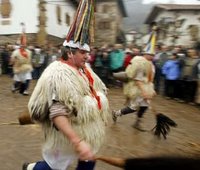
Tuesday, January 31, 2006
Zanpantzar in Zubieta

Monday, January 30, 2006
Zanpantzar in Ituren

Saturday, January 28, 2006
Today in Alsasua

Supporters of the Batasuna party wait beneath a poster written in Basque language saying ' For The Law and Democratic Solution' in Alsasua, northern Spain Saturday Jan. 28, 2006. The outlawed Basque nationalist party Batasuna, believed to be the political wing of ETA, were going to hold a political rally but it was prohibited by the authorities. (AP Photo/Alvaro Barrientos)
Snow in Okondo

Snow in Busturia

Friday, January 27, 2006
Snow in Gernika
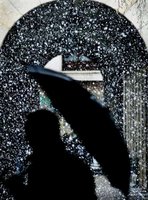
A man shelters under an umbrella from a heavy snowfall in the Spanish Basque town of Gernika January 27, 2006. Ten Spanish regions are under emergency status due to heavy snowfall and freezing temperatures. REUTERS/Vincent West
Wednesday, January 25, 2006
Peio's Nightmare
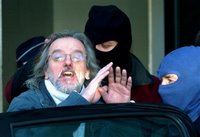
French Basque singer Peio Serbielle is escorted by hooded police officers after hearings at the Pau courthouse, southwestern France, Wednesday Jan. 25, 2006, in connection with the recent arrest of ETA's reputed top leader Mikel Antza . Serbielle is suspected to have housed Antza. (AP Photo/Bob Edme)
Monday, January 23, 2006
Barkatu
Saturday, January 21, 2006
Sinn Fein in Barakaldo

Sinn Fein parliamentary deputy Aengus O'Snodaigh, right, applauds to thousands of people rallying for Basque independence and to protest a court-ordered ban on a congress planned by the outlawed separatist party Batasuna in Barakaldo, close to the Basque port city of Bilbao, Spain, Saturday, Jan. 21, 2006. 'Prohibition is a sign of cowardice,' O'Snodaigh told the crowd, 'Peace can't begin with jailings and repression. Spain's Supreme Court outlawed Batasuna in 2003 on the grounds that it was part of the armed separatist organization ETA, closing down its offices and barring it from engaging in political activity. (AP Photo/Alvaro Barrientos)
Otegi in Barakaldo

Batasuna leader Arnaldo Otegi gestures as he speaks to some 20,000 people rallying for Basque independence and to protest a court-ordered ban on a congress planned by the outlawed separatist party Batasuna in Barakaldo, close to the Basque port city of Bilbao, Spain, Saturday, Jan. 21, 2006. Spain's Supreme Court outlawed Batasuna in 2003 on the grounds that it was part of the armed separatist organization ETA, closing down its offices and barring it from engaging in political activity. (AP Photo/Daniel Ochoa de Olza)
Today in Barakaldo
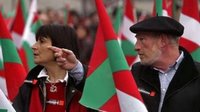

Some of the 20,000 protestors wave with Basque flags as they listen to Batasuna leader Arnaldo Otegi, left, under a banner reading in Basque 'civil and political rights' as they rally calling for Basque independence and to protest a court-ordered ban on a congress planned by the outlawed separatist party Batasuna in Barakaldo, close to the Basque port city of Bilbao, Spain, Saturday, Jan. 21, 2006. Spain's Supreme Court outlawed Batasuna in 2003 on the grounds that it was part of the armed separatist organization ETA, closing down its offices and barring it from engaging in political activity. (AP Photo/Alvaro Barrientos)
.... ... .
Friday, January 20, 2006
Support in Barakaldo
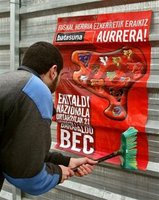
An unidentified man pastes a poster on a wall for a political meeting of the outlawed separatist Basque party Batasuna in Barakaldo, northern Spain, Friday, Jan. 20, 2006. The poster reads in the Basque language, Batasuna Lives, Batasuna wants to hold the congress tomorrow. The Batasuna party, thought to be the political wing of ETA, vowed last Tuesday to go ahead with the congress it has called for this weekend even though a Spanish judge has prohibited the meeting. The Batasuna congress, called for Saturday in a town near Bilbao, is designed to elect a new leadership for the party, which was founded in the late 1970s. (AP Photo/Alvaro Barrientos)
Alvarez in Bilbo

Joseba Alvarez, International Affairs spokesman for the outlawed Basque nationalist party Batasuna, speaks at a news conference in Bilbao, northern Spain, January 20, 2006. A Spanish High Court judge banned Batasuna from celebrating a party congress in the Bilbao Exhibition Centre (BEC) in Barakaldo tomorrow. Alvarez said that Batasuna members intended to attend a rally organized by a self-defined anonymous citizens platform 'in favour of civil rights for everyone' outside the BEC building at the same time as the planned congress. REUTERS/Vincent West
Social Activism in Barakaldo

Members of a self-defined anonymous citizens platform give a news conference in front of the Bilbao Exhibition Centre (BEC), in Barakaldo, northern Spain, January 20, 2006. A Spanish High Court judge banned the outlawed Basque nationalist party Batasuna from celebrating a party congress in the BEC tomorrow. The platform announced a demonstration 'in favour of civil rights for everyone', outside the building at the same time as the planned congress. REUTERS/Vincent West.
Thursday, January 19, 2006
Alvarez and Petrikorena

Basque radical leaders Joseba Alvarez (R) and Juan Jose Petrikorena (2nd R) look at masked Basque policeman before the closure of the offices of outlawed Basque political party Batasuna in San Sebastian January 19, 2006. A Spanish High Court judge ordered the closure of all Batasuna offices and has banned a rally called by the party on January 21, 2006 in Barakaldo, northern Spain. REUTERS/Pablo Sanchez
Permach in Donostia

Joseba Permach, one of the leaders of the outlawed separatist Basque Batasuna Party, answers questions put to him by the media after the headquarters of the Party was closed in San Sebastian, Spain, Thursday Jan. 19, 2006. The headquarters where closed on a order from the National Court. The Batasuna party, vowed last Tuesday to go ahead with a congress it has called for this weekend even though a Spanish judge has prohibited the meeting. The Batasuna congress, called for Saturday in a town near Bilbao, is designed to elect a new leadership for the party, which was founded in the late 1970s. (AP Photo/Alvaro Barrientos)
Robocops in Donostia

Masked Basque police officers prepare to enter outlawed Basque political party Batasuna's office in San Sebastian January 19, 2006. A Spanish High Court judge ordered the closure of all Batasuna offices and has banned a rally called by the party on January 21, 2006 in Barakaldo, northern Spain. REUTERS/Pablo Sanchez
Robocops Against Batasuna

Masked Basque policemen leave the offices of outlawed Basque political party Batasuna in Bilbao January 19, 2006. A Spanish High Court judge ordered the closure of all Batasuna offices and has banned a rally called by the party on January 21, 2006 in Barakaldo, northern Spain. REUTERS/Vincent West
Wednesday, January 18, 2006
Imaz in Bilbo

Josu Jon Imaz, President of the Basque Nationalist Party (PNV), speaks during a news conference in Bilbao January 18, 2006. Imaz said he planned to meet outlawed Basque political party Batasuna to hear first hand what its leaders had planned to say at a meeting in Bilbao on Saturday that has been banned by Spain's High Court. REUTERS/Vincent West
.... ... .
Tuesday, January 17, 2006
Otegi in Donostia

Arnaldo Otegi, leader of outlawed Basque party Batasuna, addresses a news conference in San Sebastian January 17, 2006. Spain's High Court banned a rally called by the radical party and suspended all of Batasuna's activities for a further two years. Otegi announced on Tuesday Batasuna will keep on calling for the rally to take place next Saturday in spite of the judicial ban. REUTERS/Pablo Sanchez
Support in Hernani
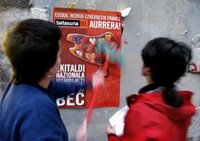
Supporters of outlawed Basque political party Batasuna paste a poster announcing a rally by party, in Hernani, northern Spain January 17, 2006. Spain's High Court banned the rally on Tuesday and suspended all of Batasuna's activities for a further two years. REUTERS/Pablo Sanchez
Txakoli in Getaria

People get their glasses filled with 'Txakoli' (typical Basque white wine) during Txakoli Day in the northern Basque town of Getaria in Spain January 17, 2006. Getaria's vineyards are the most important producers of this wine, considered by many the inheritor of a culture and a tradition carried for centuries and an element with its own voice in the life and customs of the Basque people. REUTERS/Pablo Sanchez
Announcement in Santutxu

A man walks past a poster advertising a controversial Basque nationalist rally in Santutxu, near Bilbao, January 17, 2006. Spain's High Court is due to decide on Tuesday whether to ban the January 21 rally because it may have been called by Batasuna, barred by the Supreme Court for its ties with violent separatists ETA. REUTERS/Vincent West
Monday, January 16, 2006
Dockworkers' Strike

Dock workers take part in a demonstration at the Basque seaport of Pasajes, north of Spain. A dockworkers strike snarled European ports in protest of an EU plan to liberalize port services, while an angry demonstration outside the European Parliament left a dozen police injured.(AFP/Rafa Rivas)
Carod-Rovira, Ibarretxe and Errazti
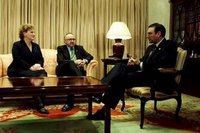
The President of Catalan pro-independence party Ezquerra Republicana, Josep-Lluis Carod-Rovira (C), Basque regional president Juan Jose Ibarretxe (R) and Eusko Alkartasuna President Begona Erratzi talk during a parliamentary visit in Vitoria, northern Spain, January 16, 2006. Carod-Rovira and Ibarretxe are seeking more autonomy for their regions and for recognition as nations within the Spanish state. REUTERS/Vincent West
Friday, January 13, 2006
A Bit of Humor
In February Spanish Premier Rodriguez "Chapuzero" decided that the only solution to the territorial crisis that he and his government's supporters had created was to rename the whole country "Catalunya". From the beginning of 2007 the official language of "Catalunya" will be Catalan. The Capital will be Barcelona and all government ministries and offices are being relocated there.The King of Catalunya, Joan Carles 1, will have his official residence in Mallorca. The use of Spanish, the former official language, is to be banned. Reactions in "Catalunya" were wide ranging. The Basque Nationalists demanded independence from Barcelona. The Galician autonomous government promised to defend the "Galego" language against the imperialism of Catalan.
In Madrid the majority of citizens refused to learn Catalan, although they are delighted that all anti-government protest marches and other public demonstrations will now take place elsewhere. For this reason alone Madrid also went up 17 points on the "Quality of life" scale. "Real Madrid" football club has been renamed "Leal Madrid" and the Madrid Nationalist Liberation Movement began a campaign for independence from Catalunya.The meltdown of the country once known as "Spain" proceeded apace when, in December, "Chapuzero" was forced to resign from office for not speaking Catalan correctly.
Thursday, January 12, 2006
Four Years Blogging
The Retired Pelota Player
Long, long before Julio Anchia came to the yellow cinderblock room in the back of the Dania Beach fronton, he learned jai-alai in a town called Marquina in the Basque country.
All the boys in that town did. The best went to a school to refine their skills, and when they left, they went to Mexico or Cuba or the United States to play professionally.
Anchia left because he did not want to grow vegetables like his parents did. When he was 16 he went to Italy, where he made $1,000 a month, then Tijuana for more money, then Miami, where he made more than $2,000 a month and finished his career. He was not a very good player. Nor was he bad, and in those days that was enough, because the sport was healthy. Twelve thousand people showed up some nights in Miami.
Tuesday, January 10, 2006
Kosovo's Puzzle
The precedent with a probable granting of independence to Kosovo could serve as a powerful impulse for the forceful resolving of many other regional conflicts. We should not rule out the option under which some older territorial disputes be revived and some new ones be set ablaze both on the Balkans (between Albania and Macedonia, Serbia and Bosnia or Bosnia and Croatia) and outside them. Thus, the Basque, Corsican and Ulster separatists will gain additional trump-cards. The same is true for the Kurds - especially those in North Iraq.
It is a long essay, and is worth reading it.
Basque Beauty Queen
Then, 1951's Miss America, Yolande Betbeze Fox, contacted the museum and offered not only her crown but also her scepter and Miss America sash.
Fox may have been the most unconventional Miss America ever. Born Yolande Betbeze in Mobile in 1930, she comes from Basque ancestry, and her dark, exotic looks were hardly typical of beauty contestants in the '50s. But her magnetism, and a well-trained operatic voice, focused the judges' attention.
Betbeze wore the fabled crown uneasily. In 1969, she recalled to the Washington Post that she had been too much of a nonconformist to do the bidding of the pageant's sponsors.One of her first acts was to inform the Catalina bathing suit company that she would not appear in a swimsuit in public unless she were going swimming. Spurned, Catalina broke with the Miss America Pageant and started Miss Universe.
When Betbeze's yearlong reign came to an end, she studied philosophy at New York's New School of Social Research. She continued to sing, appearing with the Mobile Opera Guild in The Tales of Hoffmann.In 1954 she married Matthew Fox, a businessman and movie producer, and began mounting plays in an off-Broadway theater she helped found. Today, Fox, a widow, lives much of the year in a Washington, D.C., house once owned by Jackie Kennedy.
Luckily for the Smithsonian, says Shayt, she admits to being a "bit of a pack rat," so, though she eschewed the pomp (and circumstances) of her Miss America victory, she never relinquished her crown, now part of America's cultural heritage.
Are Palestinian Flags Antisemitic?
Israeli goalkeeper Dudu Awat who currently plays for Spanish club Racing Santander, has complained about opposition supporters calling for the death of Israeli prime minister Ariel Sharon.Awat's team held second placed Osasuna to a 1-1 draw, the first time Osasuna had not won at home in the league this season.But the match was tainted by Osasuna fanatics taunting Awat throughout the game. The supporters of the Basque team are known for their racist slogans and chants.Palestinian flagsAccording to reports, the Osasuna supporters held Palestinian flags and anti-Israel banners as well as shouting "Death to Sharon" and "We wish Sharon dies."The Israeli prime minister is currently lying in an induced coma in the Hadassah hospital in Jerusalem after undergoing several operations on his brain following the stroke he suffered last Wednesday.Although clearly upset, Awat refused to repond to questions about the anti-Sharon chanting. He would only say: "I don't want to address those things. They're improper."However, Awat said that while he was playing for Santander on Sunday he was feeling worried about Sharon and his condition."Even during the match my and my family's heart was with Sharon all the time," Awat said.The Israeli international spoke of his concern for his prime minister and how he has been keeping up to date with the news via the internet."Those are difficult days for the country and I wish him a speedy recovery. It's difficult for us even here in Spain. We're following it on the Internet and hoping for the best," he said.
Osasuna fans, who are Basque, are known for their racist chants, and during the match against Santander focused their fury at the Israeli goalie. Spanish websites and journalists who covered the game reported that a large group of fans gathered behind Awat holding Palestinian flags and anti-Israel signs.
Monday, January 09, 2006
Irish Solidarity With Basque Political Prisoners
Petition in Solidarity with Basque Prisoners
SUPPORT OUR BASQUE SISTERS AND BROTHERS AND SUPPORT THE DEMAND TO:
“BRING THE BASQUE PRISONERS TO THE BASQUE COUNTRY, ACKNOWLEDGE THEIR RIGHTS!” – Ibaeta University Declaration.
There are currently almost 700 Basque citizens in prison, suffering exceptional measures that come from the so-called “antiterrorist policy”. Their situation continues to get worse. The fact that, to date, 20 people have died in jail, the latest only weeks ago, is but an example of their extremely tough living conditions.
On Saturday 26 November, 2005, representatives of 29 Basque political, trade union, and social organizations met at the Ibaeta University Campus in Donostia in order to address the issue of Basque Political Prisoners.
They agreed to make a call to denounce the consequences of the policy of prisoner dispersal and demanding the Spanish and French governments recognize the representatives of the political prisoners and engage with them so that the Basque Political Prisoners Collective (EPPK) may take part in the ongoing political process. They agree that supporting the prisoners’ rights is an essential step towards conflict resolution.
Support the demands of the Basque Pro-Amnesty movement and the organizations at the Ibaeta Forum:
· The right to respectful and dignified treatment
· End torture and ill treatment
· End isolation and beatings
· Respect for the national and cultural identity of imprisoned people.
· The right to health
· Proper healthcare--Allow doctors chosen by the prisoners to visit them
· Immediate release of those who suffer serious illnesses.
· End surveillance and restrictions in communication
· Freedom to communicate in the Basque language
· Allow Basque prisoners to freely carry out their daily lives in Basque and fully develop their language skills.
· End the obstacles to study -- Allow the possibility to carry out studies in Basque
· Women in prison have the right to be mothers in conditions that do not diminish their dignity.
· Eliminate restrictions on communication with the child’s father.
· Guarantee living conditions for children in jail. Apply parole to prisoners who have served 3/4 or 2/3 of their sentence (depending on the Penal Code under which they were tried)
· Apply the corresponding legal sentence reductions without discrimination.
· Immediate release for prisoners who suffer serious incurable diseases.
· Acknowledge the representatives elected by the Collective. Allow the Collective to freely maintain relations with other political and social actors.
· Allow the Collective to freely participate in whichever instruments for debate and discussion Basque society creates. Repatriate the Basque Prisoners!
Source: EPPK (Basque Political Prisoners Collective)
To Sign Petition: http://www.petitiononline.com/Basque/Until All Are Free - We Are All Imprisoned!
Sunday, January 08, 2006
Today on EITb
Argentinean Nobel Peace laureate Adolfo Pérez Esquivel has demanded "credibility gestures" to Spain's government and Basque armed group ETA with a view to moves towards peace. In this sense, he has quoted Basque political prisoners' transfer and an unconditional "truce" as means to make progress in talks.
"I think both the Spanish government and ETA must reach agreements. It is not only a problem between ETA and the government but also a problem of the Basque Country, which should be the leading character in this matter," he has explained throughout the interview.
Bilbao Athletic suffer undeserved and painful defeat (1-2)
Deportivo Coruña moved up to third in the Primera Liga with a 2-1 win at Athletic Bilbao on Saturday.
An own goal from Bilbao defender Mari Lacruz and a howling error by keeper Daniel Aranzubia gifted Depor a fourth away victory in a row that pushed them within six points of second-placed Osasuna.
Basque Premier convinced that outlawed Batasuna will run for elections 2007
Basque Premier Juan José Ibarretxe is convinced that outlawed Batasuna will take part in elections 2007, as previously, "events" that will make it possible to participate will occur.
"It would be a bad sign for the future if Batasuna does not participate in next year's elections," he stated in an interview with the Diario de Noticias group.
